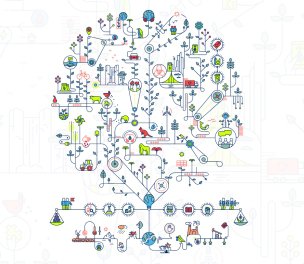* Photo: Social media
Click to read the article in Turkish
As part of its 2020 Human Development Report, the United Nations Development Programme (UNDP) has shared a series of country-based statistics and rankings on human development, gender development, gender equality and multidimensional poverty across the world.
CLICK - Overview of HDR Report
The UNDP has also shared briefing notes for individual countries on the 2020 Human Development Report. In its briefing note for Turkey, the UNDP has said under the chapter of Gender Inequality Index (GII): "Turkey has a GII value of 0.306, ranking it 68 out of 162 countries in the 2019 index," which means that the country has deteriorated by two ranks.
The programme has shared the following information about Turkey:
"In Turkey, 17.4 percent of parliamentary seats are held by women, and 50.2 percent of adult women have reached at least a secondary level of education compared to 72.2 percent of their male counterparts. For every 100,000 live births, 17.0 women die from pregnancy related causes; and the adolescent birth rate is 26.6 births per 1,000women of ages 15-19. Female participation in the labour market is 34.0 percent compared to 72.6 for men."
What is Gender Inequality Index (GII)?The 2010 Human Development Report introduced the GII, which reflects gender-based inequalities in three dimensions – reproductive health, empowerment, and economic activity. Reproductive health is measured by maternal mortality and adolescent birth rates; empowerment is measured by the share of parliamentary seats held by women and attainment in secondary and higher education by each gender; and economic activity is measured by the labour market participation rate for women and men. The GII can be interpreted as the loss in human development due to inequality between female and male achievements in the three GII dimensions. |
Human development over the years
In the chapter of Human Development Index (HDI), the briefing note for the country has read, "Turkey's HDI value for 2019 is 0.820— which put the country in the very high human development category—positioning it at 54 out of 189 countries and territories."
The following details have been shared about the course of Turkey's Human Development Index over the years: "Between 1990 and 2019, Turkey's HDI value increased from 0.583 to 0.820, an increase of 40.7 percent. Between 1990 and 2019, Turkey's life expectancy at birth increased by 13.4 years, mean years of schooling increased by 3.6 years and expected years of schooling increased by 7.7 years. Turkey's GNI per capita increased by about 121.4 percent between 1990 and 2019."
Gender Development Index: Turkey in Group 4
As for the Gender Development Index (GDI), the UNDP's briefing for Turkey has said, "The GDI is calculated for 167 countries. The 2019 female HDI value for Turkey is 0.784 in contrast with 0.848 for males, resulting in a GDI value of 0.924, placing it into Group 4."
According to the UNDP, Group 4 comprises countries with medium to low equality in HDI achievements between women and men.
What is Gender Development Index (GDI)?In the 2014 Human Development Report, HDRO introduced a new measure, the GDI, based on the sexdisaggregated Human Development Index, defined as a ratio of the female to the male HDI. The GDI measures gender inequalities in achievement in three basic dimensions of human development: health (measured by female and male life expectancy at birth), education (measured by female and male expected years of schooling for children and mean years for adults aged 25 years and older) and command over economic resources (measured by female and male estimated GNI per capita). |
(EMK/SD)





